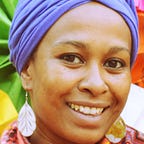A Far-Fetched Analogy: How Dominant Cultures Manifest in International Schools
I have been living under a rock, so much so that in 2016 my friend had to send me the Vimeo limited link to Beyoncé’s Lemonade because she probably pictured me wandering confused into some conversation asking “Beyoncé sells lemonade now?!” She followed it up with: ‘you have to check this out’. I felt quenched and was so joyful in my dire diaspora, by the glorious parade of beautiful black women and black art when I finally viewed it five days later.
Between being displaced, unsettled, and an unsubscriber of social media, I preserve what time I have for music, to belt it out with Nina and lip-sync to Eartha because that is one way I heal. I drifted from pop culture in its various forms and I have a handful of sisters who throw me a lifeline every now and then.
When I finally did subscribe to Netflix, I stumbled upon a raw and reformed David Letterman in the amazing My Next Guest Needs No Introduction. I spotted an episode with Jay-Z (*spoiler alert) and sat up for what was supposed to be an audiovisual cheat sheet for me. I was poised to succinctly learn about Jay-Z’s evolution in an intimate one-hour interview. I can finally say something the next time Mr. and Mrs. Carter come up in conversation.
An hour later I was staring down my empty tea cup feeling dispirited. I had to go back and check that this was listed under 2018. I Googled it to find this raving review on Rolling Stone on 10 things we learned about Jay-Z from that interview, and then I was just plain mad.
The conversation included Jay-Z’s upbringing, the use of the n-word, feud amongst rappers, the incarceration and (in)justice system and various introductory aspects of Hip hop music and life in black America. I can only name 99 Problems assuredly, but I do know this much about him as an English-speaking black woman roaming this world. These cultural and socio-economic issues have also been covered extensively by established black writers, filmmakers, singers, musicians, comedians and by Jay-Z himself, not least of all through his music.
Why are we consistently overlooked as an audience? The cultural codes breached during the interview were not lost on me either. I physically cringed when Letterman asked Jay-Z if his mother knew of his source of income as a young boy. This came in the context of Jay-Z showing such vulnerability talking with respect and adoration for his mother who struggled to raise him and three siblings as a young single black woman in poverty. Just, why does anybody need to know that? That, and Letterman attempting to joke about attempting to say the n-word: we are not there yet, and this audience is certainly not mature enough if this is what they came to learn.
There were enough segues for Letterman to learn about Jay-Z today, something which I am sure any person can learn from, even if you think he is ‘just a rapper’. He is; one who dominates a small corner of this earth with 22 Grammys to show for it. Jay-Z is a hugely successful artist, a major influence in black America, a mogul and I learned nothing of how he orchestrates that, what he aspires to do with it, and how much that costs him as a man, father and husband. I learned nothing of the weight and complexity of trying to honor those before him, and pave the way for those who will come after him, even if it is only in his corner of the world.
Letterman’s charm and dispositions were endearing and Jay-Z’s humble mannerisms, understated insights, and brevity of speech were so heartwarming. As a black woman, I have tremendous appreciation and understanding for how he represented, how he spoke about his mother, wife and daughter. And of course, the subtle and implicit humor and play on words between them was fluid. But decades later in Jay-Z’s fascinating life and Letterman’s career- which I have great respect for- the interview still does not reach an audience beyond ‘Dear White People, this is an important Black Man to reckon with and look where he started’. Of course his beginnings are salient, but as a black woman I wanted to learn about how he is leading and where he is going, I was looking to be inspired again. It is not enough that Jay-Z represents, he should have been invited to envision.
I have sat through numerous workshops in international schools which ended with me staring down my empty tea cup feeling dispirited. Even when the presenter had a wealth of knowledge to offer, I was denied a learning opportunity because the discourse constructed was never intended for me. When you deliberately consider an audience, you let their voices facilitate the conversations. Like this interview, these workshops in international schools offer me very little, if anything at all. Some of them are downright dubious, going as far as appropriating my own culture and blindly borrowing from my religious practices in the form of handsomely-paid ‘mindfulness’ workshops led by mediocre practitioners, or ‘cultural diversity’ sessions where a white woman explains to me how she experiences racism the same way I do and I dare not pull a face.
School communities must take collective responsibility for the (mis)conduct of Diversity, Equity and Inclusion work at their schools- it is not our problem, it is everybody’s work. Leaders, please do your research, be critical and invest in the fine caliber that exists. And please, do not ‘catch us in the hallway’ to ‘get our opinion on the upcoming workshop’. Make space for us, cut out time for us, pay us, credit us (publicly), and most importantly, listen to us. We will all learn so much more about each other and ourselves, and move forward together. Because you cannot move forward without us.
